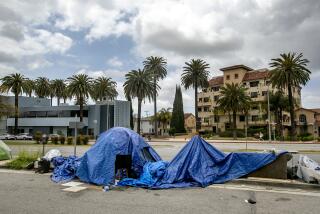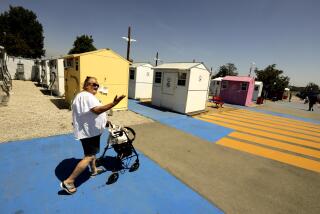Hobo and Dreamer: A homeless man and his dog hoped to finally go home. Then COVID-19 arrived
Leland “Hobo” Goodsell might have just been another homeless man on the streets of Goleta, Calif., but he had gained something of a reputation over the 14 years he’d lived there.
His dog, Dreamer, might have had something to do with it.
Or it could have been the 946 citations he received for living on the streets. But no matter what, he was easily able to charm passersby into becoming friends.
It was his coy attitude and sense of humor that drew Goleta resident and lawyer Gabriela Ferreira to Hobo.
Ferreira would always do her best to give to the homeless, so when she spotted Hobo after attending a barbecue, her first instinct was to ask if he needed any food. He chose ribs from a restaurant across the street and insisted she join him for dinner.
“He was always pushing the limits,” she said. But they enjoyed a meal together on the outside patio of the restaurant and soon became friends. Since that first encounter, Ferreira would buy many meals for Hobo, let him live in her backyard and even paid for a year of motel stays when he was involved in a lawsuit, which he paid back in full when he settled the case.
It was an unlikely friendship and Hobo didn’t take it for granted. “Why do you do this for me?” he would ask. “I’m such a pain in the neck.”
“I don’t know why,” Ferreira would reply. “But I love you, so I’m going to keep doing it.”
Hobo was dropped off at an orphanage with his two sisters in Missoula, Mont., when he was 3. He was only 11 when he jumped a train and headed west. The other train hoppers all called him the “Littlest Hobo.” The name stuck, and he would correct anyone who called him by his birth name. “Don’t call me Leland! I’m a hobo and I’m proud of it,” he would say indignantly.
Once in California, he found work laying pipes, construction jobs, auto repair and building malls. He married twice. In Yreka, Calif., he ran a recycling business with his wife and son.
After losing his wife to pancreatic cancer and his son to a heroin overdose in the same week, Hobo and Dreamer packed up and left town. They lived for awhile in Santa Cruz before thumbing down the coast, landing in Santa Barbara. He decided they would stay.
Once, he bought an old motorboat and ended up stranded in the middle of the harbor for days, with no food or water or way back to shore. The harbor patrol finally rescued him after a friend reported him missing.
“The whole thing was just a desire to be housed again, and to have a place to call his own,” said his friend Deborah Barnes, an outreach worker who ran an advocacy group for the homeless. “He is a cowboy, not a swimmer. It was a foolish plan.”
A Labrador-ridgeback mix, Dreamer was the only family Hobo had left, and it was a miracle the two had lived so long. They had endured attacks by unwelcoming neighbors and street gangs and survived a serious accident with a gas tanker truck that split Hobo’s head and broke his leg. Hobo was never the same after that.
Hobo was friendly with a sharp sense of humor and a twinkle in his eye, which struck Barnes as an unusual source of positivity.
“When you serve in the street, there’s a lot of sadness and a lot of tension for people just trying to exist each hour of each day, especially the mentally ill,” she said. “But Hobo had a way of lightening everything up with his jokes.”
One day as Barnes was bringing sleeping bags, clothing and other necessities for her street friends, Hobo took his bicycle and dog cart to save a parking space for her arrival, and made a sign for her table that read “the doctor is in.” When she left the table to serve the evening meal to the long line, he replaced it with, “the doctor is out.”
He was also helpful with his mechanical skills, repairing bicycles and wheelchairs for other homeless people. “He created and repaired anything with chewing gum and string,” Barnes said. “Always helpful and always paid a person back. He expected that of his cronies too.”
Although his outreach friends provided for him on occasion, he always checked in on them too. His nearly daily calls started with, “Hey sis, this is your Hobo, and has anyone told you ‘I love you’ today?” he would ask Barnes. “Well, there you go. I just did.”
But alcohol brought out a different side and often interfered in his relationships. “He would go through phases where you’re the best person ever in his life, and then he hates you, and then he goes to the next one,” Ferreira said.
Barnes helped him into several rehab clinics, but he always relapsed. His alcoholism, combined with the lingering effects of the accident, made him even more belligerent. When he couldn’t, Barnes and Ferreira would take care of Dreamer.
The pandemic’s toll: Lives lost in California
Hundreds of people have died in California due to the COVID-19 pandemic. These are some of their stories.
After the accident, Ferreira’s colleague helped Hobo with a lawsuit, but he never stayed sober long enough to go to court, so they settled the case. Barnes attempted to get him into housing for years, but he was resistant, especially with places that wouldn’t allow dogs.
“It was the most awful situation,” Ferreira said. “He had money, but he couldn’t have housing.”
Hobo had a desire to return home in the last two years of his life. Montana was beckoning. “Dreamer needs to see where I came from,” Hobo would say.
Barnes and the Santa Barbara Police Department tried to help Hobo get back to Missoula to see his last living sister, and one police officer even arranged to drive him, as a favor. But Montana’s cold held Hobo back — living in a wheelchair in snow was not optimal.
He never would make it back to Missoula alive.
Hobo eventually bought an old 1987 Ford truck to sleep in during the rainy season, and to keep safe from late-night attackers. Goleta sheriff’s deputies overlooked city rules on moving vehicles every 36 hours so he could keep it parked, and ignored the fact he didn’t have a license.
The last time Barnes or Ferreira saw Hobo was in March, before the state went on lockdown. When he got sick, it was difficult for them to help. He refused to go to a hospital for fear of leaving Dreamer behind.
Instead, another man, Tino, took care of Hobo, cleaning his truck, walking Dreamer and bringing food to him. He checked on him daily until Hobo finally agreed to go to the hospital. “Tino was his guardian angel,” Barnes said.
He was already delirious by the time he went into the hospital. After five days in ICU, the doctors didn’t understand what he was trying to communicate. Over the phone, Barnes told them, “Do me a favor, walk in there, and tell him ‘Dreamer is fine. Dreamer is doing really well.’” He died April 4, an hour after they told him. He was 66, and the first COVID-19 death in south Santa Barbara County.
His ashes were returned to Montana, where his sister still lives. Dreamer now lives in Goleta with Tino. When Dreamer’s time comes, his ashes will be reunited with his master’s in Hobo’s hometown.
More to Read
Sign up for Essential California
The most important California stories and recommendations in your inbox every morning.
You may occasionally receive promotional content from the Los Angeles Times.











